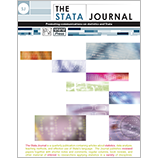Reliable estimation of generalized linear mixed models using adaptive quadrature
Sophia Rabe-Hesketh
Institute of Psychiatry
King's College London
|
Anders Skrondal
National Institute of Public Health, Oslo
|
Andrew Pickles
School of Epidemiology and Health Science
The University of Manchester
|
Abstract. Generalized linear mixed models or multilevel regression models have become
increasingly popular. Several methods have been proposed for estimating such
models. However, to date there is no single method that can be assumed to
work well in all circumstances in terms of both parameter recovery and
computational efficiency. Stata’s xt commands for two-level
generalized linear mixed models (e.g., xtlogit) employ
Gauss–Hermite quadrature to evaluate and maximize the marginal log
likelihood. The method generally works very well, and often better than
common contenders such as MQL and PQL, but there are cases where quadrature
performs poorly. Adaptive quadrature has been suggested to overcome these
problems in the two-level case. We have recently implemented a multilevel
version of this method in gllamm, a program that fits a large class
of multilevel latent variable models including multilevel generalized linear
mixed models. As far as we know, this is the first time that adaptive
quadrature has been proposed for multilevel models. We show that adaptive
quadrature works well in problems where ordinary quadrature fails.
Furthermore, even when ordinary quadrature works, adaptive quadrature is
often computationally more efficient since it requires fewer quadrature
points to achieve the same precision.
View all articles by these authors:
Sophia Rabe-Hesketh, Anders Skrondal, Andrew Pickles
View all articles with these keywords:
adaptive quadrature, gllamm, generalized linear mixed models, random-effects models, panel data, numerical integration, adaptive integration, multilevel models, clustered data
Download citation: BibTeX RIS
Download citation and abstract: BibTeX RIS
|
